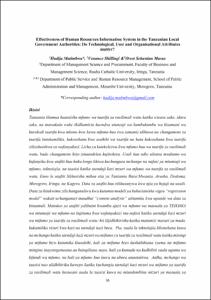Effectiveness of Human Resources Information System in the Tanzanian Local Government Authorities: Do Technological, User and Organisational Attributes matter?

View/
Date
2021-06-30Author
Matimbwa, Hadija
Shillingi, Venance
Masue, Orest
Metadata
Show full item recordAbstract
Tanzania introduced Human Resources Information System (HRIS) in her Ministries, Departments and Agencies (MDAs) in an intentional move to replace the manual record system due to challenges of incomplete, inaccurate and out dated employees’ information, despite the implementation of HRIS same challenges still prevail. It is with this understanding; the current study examined the influence of user, technological and organisational characteristics on HRIS effectiveness in six regions of Tanzania Mainland namely; Mwanza, Arusha, Dodoma, Morogoro, Iringa, and Kagera. Data were collected through questionnaire and interview methods. The ordered regression model was used to analyse quantitative data whereas content analysis was used to analyse qualitative data. Information and Technology (IT) skills and employee commitment were revealed as user characteristics with statistically significant influence on HRIS effectiveness (in terms of timeliness, completeness and accuracy). Furthermore, technological characteristics that had significant influence on HRIS effectiveness were usefulness, compatibility, complexity and reliability. Organisational characteristics with significant influence on HRIS effectiveness were IT infrastructure and the support that employers rendered to their employees. Study findings imply, frequent training on HRIS use, nurturing staff commitment; encouraging experience-sharing, improvement of technological features, provision of sufficient support to employees, and recruiting sufficient and qualified ICT personnel are central to the effectiveness of HRIS.
